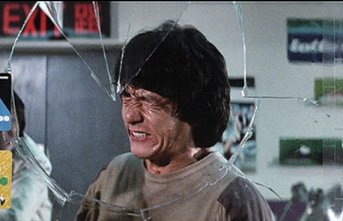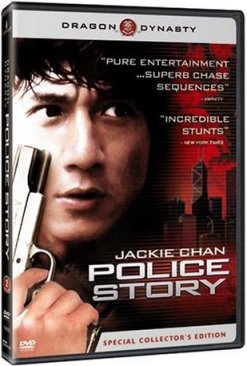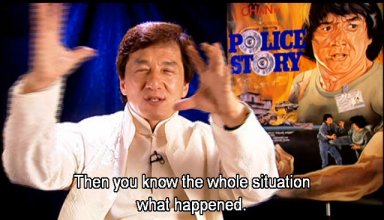| Police Story
For a decade
or two, Jackie Chan had a legendary reputation among hardcore
movie fans without having a real American film career. Obviously,
the two aren't mutually inclusive, but it seemed odd for
the guy to be held in such high esteem when most Americans
dimly remembered him for The Cannonball Run. Maybe
someone caught The Big Brawl on cable.
While many here
stayed ignorant of him, Chan became an international superstar.
He eschewed the chance to be a sidekick in U.S. film, instead
staying on top in his own films in Hong Kong. In the late
nineties, he had a resurgence of popularity, culminating
in the buddy cop movie Rush Hour. The success of
that Brett Ratner-directed movie made Chan as big here as
he had long been in the rest of the world, and it was about
damned time.
For while mainstream
American audiences weren't seeing his films, guys making
American movies sure were. So it makes sense that the recent
(and overdue) DVD release of Police Story spends
almost as much time on Ratner gushing over Chan as it does
on the movie itself.
But it's worth
his gushing. Though obviously steeped in conventions of
1985, Police Story makes it absolutely clear why
Chan is so cool. When you take into account that it's also
directed by him, it seems a shame that he hasn't chosen
to stretch that muscle in American film.
By turns action-packed
and comedic, Police Story noodles along a bit in
leading up to its climax, but that's part of the Chan style.
Inspired and influenced by silent film comedians, he creates
a stew that shows the grittiness of police operations in
Hong Kong while giving relief that a cop could still be
a bit goofy.
You can probably
see the influence on American movies already.
It's not a comedy,
though, as the third act is incredibly intense. Unremitting
in its action and violence, it ratchets up even more so
when you realize that there aren't really any camera tricks
going on - Chan never cut away so someone else could step
in for him.
(Like one of
his idols, Buster Keaton, age and American insurers has
lessened Chan's ability to be outrageously physical by himself.)
Police Story
was also a turning point for Chan. Putting his own reputation
on the line, Chan used a lot of his own money to finance
it, and pushed the limits of what Asian audiences would
expect in an action storyline. Asian cinema expert Bey Logan
notes in the commentary that even so, the film has a different
ending in Asia than it does here. That's included in the
disc if you're interested.
Logan
and Ratner provide the commentary (and a separate tribute),
which provides a lot of detail but also contains a lot of
enthusiastic gasps from Ratner.
As much
a love letter from an obviously man-crushing director, the
commentary reveals how much this movie has influenced Ratner's
career - and he lets slip plot points from Rush Hour
3 as he admits how he's borrowed a few ideas and shots
from Chan. Depending on your opinion of Ratner, thank Chan
or forgive him.
That's not to
say Chan isn't involved here. The interview included here
is fascinating to watch, especially when Chan opens up about
the truly dangerous physical work he and his stunt team
were doing. One stunt in Police Story gets shown
three times; Logan claims it's because at point in the story,
Chan had generated enough good will to get away with something
like that. Let me offer up instead that, hey, if you could
have been killed doing a stunt, you'd better wring as much
mileage out of it as possible.
 |
If you're looking
for a different perspective, Chan's stunt team also gets
featured. Known as Sing Ga Ban, they offer fairly honest
insights about their standing in the Hong Kong film industry
as a result of working with Chan. The featurette also leaves
an impression that despite sometimes literally putting their
lives on the line for the filmmaker, they don't feel particularly
close to him. That could be the result of translation errors,
as the subtitles seem to be pretty literal instead of nuanced.
Without all
those extras, this release would still be a worthwhile purchase.
As a movie, Police Story meets the most important
test: it still stands up as a good story with a finale that
has to be seen to be believed. Hopefully, this will pave
the way for another resurgence of Jackie Chan's best being
pushed to the mainstream.
Jackie
Chan's Police Story (Special Collector's Edition)
|









